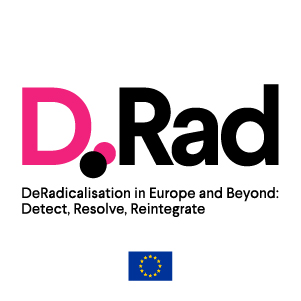D.Rad - DeRadicalisation in Europe and Beyond: Detect, Resolve, Reintegrate

D.Rad is a comparative study of radicalisation and polarisation in Europe and beyond. It aims to identify the actors, networks and wider social contexts driving radicalisation, particularly among young people in urban and peri-urban areas. D.Rad conceptualises this through the I-GAP spectrum (injustice-grievance-alienation-polarisation) with the goal of moving towards the measurable evaluation of de-radicalisation programmes. Our intention is to identify the building blocks of radicalisation, which include the person’s sense of being victimised, of being thwarted or lacking agency in established legal and political structures and coming under the influence of “us vs them” identity formulations.
D.Rad benefits from an exceptional breadth of backgrounds. The project spans national contexts including the UK, France, Italy, Germany, Poland, Hungary, Finland, Slovenia, Bosnia, Serbia, Kosovo, Israel, Turkey, Georgia, and Austria. It bridges academic disciplines ranging from political science and cultural studies to social psychology and artificial intelligence. Dissemination methods include D.Rad labs, D.Rad hubs, policy papers, academic workshops, visual outputs and digital galleries. As such, D.Rad establishes a rigorous foundation in order to test practical interventions geared to prevention, inclusion and de-radicalisation. With the possibility of capturing the trajectories of this diverse geographical backgrounds and several minority nations, the project will provide a unique evidence base for the comparative analysis of law and policy as nation states adapt to new security challenges. The process of mapping these varieties and their link to national contexts will be crucial in uncovering the strengths and weaknesses in existing interventions. The Austrian Academy of Science together with Helsinki University leads the work package that focuses on spatial aspects of (de)radicalisation.
D.Rad has three core objectives:
1. Detect Trends: D.Rad aims to identify the actors, networks, and wider social contexts driving radicalisation, especially in the emerging context of everyday polarisation over mundane issue in micro-spatial environments, in order to base interventions in evidence grounded in contemporary data and methodologies.
2. Resolve Drivers: D.Rad aims to understand the online and offline drivers that turn grievance, alienation and polarisation into radicalisation, so that policies can more effectively target underlying problems of social exclusion.
3. Re-integration and Inclusion: D.Rad aims to understand how individuals affected by grievance, alienation and polarisation can be re-integrated into the established polity or social groups, without compromising personal or collective liberties.
For further information, please visit the projects’ homepage
Publications
- Haselbacher, M., Josipovic, I. and U. Reeger, 2021. De-radicalisation and Integration Legal & Policy Framework in Austria. Country Report 4.1 for the D.Rad Project. Onlines: https://dradproject.com/?publications=de-radicalisation-and-integration-legal-policy-framework-in-austria
- Haselbacher, M., Mattes, A. and U. Reeger, 2021. Stakeholders of (De-) Radicalisation in Austria. Country Report 3.1 for the D.Rad Project. Online: https://dradproject.com/?publications=stakeholders-of-de-radicalisation-in-austria
- Haselbacher, M. and U. Reeger, 2021. Cultural Drivers of Radicalisation in Austria. Country Report 5.1 for the D.Rad Project. Online: https://dradproject.com/?publications=cultural-drivers-of-radicalisation-in-austria
- Haselbacher, M. and U. Reeger, 2021. Trends of Radicalisation in Austria. Country Report 3.2 for the D.Rad Project. Online: https://dradproject.com/?publications=trends-of-radicalisation-in-austria
Duration
December 2020 to December 2023